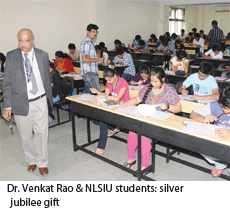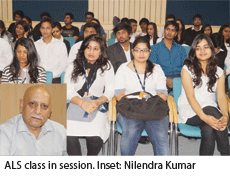Inevitably the NLSIU, Bangalore, promoted in 1987 by the Bar Council of India, was placed on the top rung of the podium in a survey of India’s most respected law colleges
 In almost all democratic nations governed by the rule of law, the legal system and legal profession are citizen friendly. India, the world’s most populous democracy, is an exception. All citizens dread becoming involved or being caught within the remorseless wheels of the legal system. Contemporary India is groaning under the weight of the law’s delay and the legal profession’s apathy.
In almost all democratic nations governed by the rule of law, the legal system and legal profession are citizen friendly. India, the world’s most populous democracy, is an exception. All citizens dread becoming involved or being caught within the remorseless wheels of the legal system. Contemporary India is groaning under the weight of the law’s delay and the legal profession’s apathy.
Currently over 30 million cases are pending in the nation’s shabby court-rooms, and delays of a decade or more before first adjudication of civil and criminal cases are routine. This is because India has a mere 13.5 judges per million population compared with 55 in the UK, and 105 in the US. In addition, the civil and criminal procedure laws haven’t been rewritten for over a century, and India is one of few countries which imposes court fees and judges seldom award costs to the winning party of a civil dispute. Moreover, while lawyers are unloved the world over, it’s not an exaggeration to say that in India they are hated because of their reputation for delay and avarice.
Against this dismal backdrop which highlights that lawyers, judges and the legal system urgently need an image makeover, the editors of this publication requested the Delhi-based market research and opinion polling company C fore to also include the country’s most well-known law schools in the nationwide survey, to rate and rank the country’s best institutions of profess-ional education. Accordingly, the sample respondents comprising 1,513 industry managers, 815 professional college faculty and 726 students, were also asked to rate the country’s Top 20 law schools on four parameters — competence of faculty, pedagogic systems and processes, placements, and infrastructure and support systems.
Inevitably the National Law School of India University (NLSIU), Bangalore promoted in 1987 by the Bar Council of India which routinely tops all surveys of the country’s best law schools, was placed on the top rung of the podium by the informed respondents of the inaugural EW-C fore survey of India’s most respected professional colleges. Rated #1 on every parameter, NLSIU bested NALSAR, Hyderabad; the West Bengal National University of Juridical Sciences, Kolkata, National Law University, Delhi, and National Law University, Jodhpur, which were ranked the Top 5.
“Although NLSIU is routinely ranked the country’s best law school, we are nevertheless delighted to learn that we have been top-ranked in the EW-C fore inaugural survey. The top rank awarded to NLSIU by a dedicated, education-focused public-ation has come as a welcome gift to us on the eve of the school’s silver jubilee anniversary which falls on July 1. The highly competent faculty of NLSIU is well aware that while it is relatively easy to get to the top, it’s harder to remain there, and we continue to accord high priority to improving our pedagogic systems and processes and research not only to produce highly skilled graduates, but to improve outcomes in the legal system as a whole,” says Dr. Venkat Rao, an alumnus of Dharampur (Odisha) and Andhra universities who taught at the latter for 35 years before he was appointed vice chancellor of the wholly residential NLSIU (student strength: 500) in 2009.
 Major General (Retd) Nilendra Kumar, an alum of Lucknow University, the Jamnalal Bajaj School of Manag-ement Studies, Mumbai, National Defence Academy, Pune, the Indian Military Academy, Dehradun and former Judge Advocate General of the Indian Army (2001-09), who is currently director of the Amity Law School (ALS), housed within the magnificent campus of Amity University, Noida, is equally pleased with the Top 10 ranking of the relatively young ALS (estb. 1999) which has an aggregate enrolment of 1,200 students mentored by 50 faculty.
Major General (Retd) Nilendra Kumar, an alum of Lucknow University, the Jamnalal Bajaj School of Manag-ement Studies, Mumbai, National Defence Academy, Pune, the Indian Military Academy, Dehradun and former Judge Advocate General of the Indian Army (2001-09), who is currently director of the Amity Law School (ALS), housed within the magnificent campus of Amity University, Noida, is equally pleased with the Top 10 ranking of the relatively young ALS (estb. 1999) which has an aggregate enrolment of 1,200 students mentored by 50 faculty.
“ALS, Noida has quickly established itself as one of the country’s most respected law schools for its clinical mode of legal education, innovative teaching, proactive placements and encouragement of legal entrepren-eurship. Amity University has invested heavily in the infrastructure of this school which enables us to hold moots and legal aid clinics in real settings. Moreover, there is strong emphasis on research in ALS and faculty are encouraged and facilitated to enhance their qualifications and publish papers in respected law journals in India and abroad. A strong foundation has been built for the continuous improvement and develop-ment of ALS, Noida,” says Gen. Kumar.
With the promotion and smooth take-off of new generation law schools which dominate the EW-C fore league table, there may be some hope of reviving India’s collapsing legal system.
To see the Top 20 league table visit http://www.educationworld.in/rank-law/2013.html